|
De Britse schrijver en cameraman Jasper Fforde werd geboren op 11 januari 1961 in Londen. Zie ook alle tags voor Jasper Fforde op dit blog.
Uit: The Eye of Zoltar
“The first thing we had to do was catch the Tralfamo-saur. The obvious question, other than “What’s a Tralfa-mosaur?” was “Why us?” The answer to the first question was that this was a magical beast, created by some long-forgotten wizard when conjuring up weird and exotic creatures had been briefly fashionable. The Tralfamosaur is about the size and weight of an elephant, has a brain no bigger than a Ping-Pong ball, and can outrun a human. More relevant to anyone trying to catch one, Tralfamo-saurs aren’t particularly fussy about what they eat. And when they are hungry — which is much of the time — they are even less fussy. A sheep, cow, rubber tire, garden shed, antelope, smallish automobile, or human would go down equally well. In short, the Tralfamosaur is a lot like a Tyrannosaurus rex, but without the sunny disposition. And we had to capture it. Oh, and the answer to the “Why us?” question was that it was our fault the rotten thing had escaped. In case you’re new to my life, I’m sixteen, a girl, and an orphan — hey, no biggie; lots of kids don’t have par-ents here in the Ununited Kingdoms, because so many people have been lost in the endless Troll Wars these past sixty years. With lots of orphans around, there’s plenty of cheap labor. I got lucky. Instead of being sold into the garment, fast food, or hotel industry, I get to spend my six years of indentured servitude at Kazam Mystical Arts Management, a registered House of Enchantment run by the Great Zambini. Kazam does what all Houses of En-chantment used to do: rent out wizards to perform magi-cal feats. The problem is that in the past half century, magic has faded, so we are really down to finding lost shoes, rewiring houses, unblocking drains, and getting cats out of trees. It’s a bit demeaning for the once-mighty sorcerers who work for us, but at least it’s paid work. At Kazam I found out that magic has not much to do with black cats, cauldrons, wands, pointy hats, and broomsticks. No, those are only in the movies. Real magic is weird and mysterious, a fusion between science and faith.”
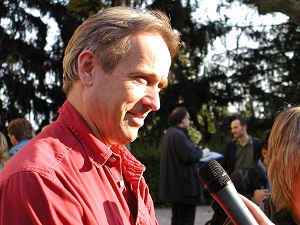
Jasper Fforde (Londen, 11 januari 1961)
De Duitse dichteres en schrijfster Katharina Hacker werd geboren op 11 januari 1967 in Frankfurt am Main. Zie ook alle tags voor Katharina Hacker op dit blog.
Uit:Die Erdbeeren von Antons Mutter
“Der kleine Garten, ein Acker eigentlich, der früher, in Antons Kindheit, ringsum an Felder gegrenzt hatte, jetzt an weitere Vorgärten stieß, nur an seiner Rückseite ins Freie überging, war umgegraben, die Erde sah frisch aus, vereinzelt stakten Gräser hervor, an einer Stelle war ein großer Löwenzahn gewachsen und nahe am Zaun drängten sich die weichen Blätter von Beinwell.
Muß raus, brummte Helmer, der Bauer, der inzwischen eine kleine Gärtnerei betrieb. Das wächst, da haben Sie keine Vorstellung von! Er bückte sich, grub mit den Fingern, riß drei der langen Wurzeln aus. Immer das gleiche, wird man nie wieder los.
Anton stand neben ihm und blinzelte in das diffuse Licht.
Wie alt sind Sie jetzt eigentlich? fragte Helmer. Dreiundvierzig, antwortete Anton.
Na auch schon. Und keine Kinder, und die Schwester immer noch in Amerika?
Immer noch, sagte Anton.
Da haben Sie für Ihre Eltern ja Zeit.
Ich bin Arzt, wandte Anton ein.
Paßt doch. Helmer schaute zu ihm, in seinen Augen mischten sich Kummer und ein freundlicher Spott.
Erst die Erdbeeren, sagte Anton.
An den Sträuchern, die in kleinen, schwarzen Töpfchen darauf warteten, wieder eingesetzt zu werden in die Erde, hingen schon grüne Früchte. Helmer schüttelte den Kopf.
Anton wollte in zwei Wochen wiederkommen, und dann wieder zur Ernte.
Wässern kann ich sie Ihnen, heute und morgen, daß ein paar angehen. Stroh können Sie hintun nächstes Mal, sagte Helmer. Ist gut gegen die Fäule. Und gegen Schnecken. Viel werden wird das aber trotzdem nicht.“
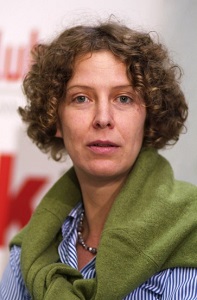
Katharina Hacker (Frankfurt am Main, 11 januari 1967)
De Griekse dichter, schrijver en zeeman Nikos Kavvadias werd geboren op 11 januari 1910 in Nikolski Ousouriski. Zie ook alle tags voor Nikos Kavvadias op dit blog..
A Black Stoker From Djibouti
I will commune with salty sea water
gathered from your body drop by drop,
in an ancient Algerian copper cup,
like the one pirates drunk from, before the fight.
Where do you come from? Babylon
Where are you going? To the eye of the storm
Whom do you love? A Gypsy girl
What is her name? Fata Morgana
A ship sail made of leather,all smeared with wax,
the smell of cedar-wood, of incense and varnish,
like the scent of an ageing vessel's hold
built long ago in Euphrates or Phoenicia.
Flame-hued rust from the mine tunnels in Sinai
the mining docks in Gerakini and Stratoni
this thin coating, this sacred rust gives birth to us,
it nurtures us, it feeds on us and then kills us
Where do you come from? Babylon
Where are you going? To the eye of the storm
Whom do you love? A Gypsy girl
What is her name? Fata Morgana
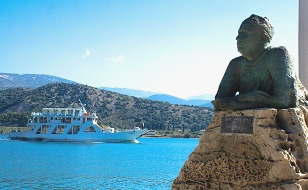
Nikos Kavvadias (11 januari 1910 – 10 februari 1975)
Standbeeld bij de haven van Argostoli
De Amerikaanse schrijver en columnist Marc Acito werd geboren op 11 januari 1966 in Bayonne, New Jersey. Zie ook alle tags voor Marc Acito op dit blog.
Uit: How I Paid for College
"Oh, baby doll, these poor, poor people," Aunt Glo says, ironing and crying, crying and ironing. (Aunt Glo calls everybody baby doll, partly out of affection, but mostly because she can't remember jack shit.) "I just thank the Virgin Mother that my Benny is dead, God rest his soul, so I'll never have to know the pain of divorce."
Even before her stroke, Aunt Glo operated according to a logic all her own. She is, after all, the woman who named her only son Angelo D'Angelo.
Sweat and tears mix on Aunt Glo's pudgy face and her crepe-y arm jiggles as she irons back and forth. Behind her, Angelo's collars hang clipped to a clothesline like severed doves' wings. "It's just so sad for the children," she sighs.
Oh, please, not this.
I know that sad-clown-in-a-black-velvet-painting look, that sympathetic tone, that warm washcloth of pity that grown-ups are always trying to wipe all over me. What she really means, what they all really mean is, "I'm sure your mom had her reasons, Edward, but what kind of mother leaves her own children?"
I'm fine, I want to say, I'm fine. I have my career ahead of me. My art. My friends. Besides, it's not like I don't ever see my mom. True, I never know when she's going to show up, but that's part of what makes her so cool: she's a Free Spirit. Our bond is more spiritual than temporal. But still everyone treats me like I'm Oliver fucking Twist. “
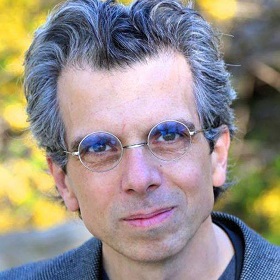
Marc Acito (Bayonne, 11 januari 1966)
De Nederlandse (sport)journalist, schrijver en radio- en televisiepresentator Martinus Jan (Mart) Smeets werd geboren in Arnhem op 11 januari 1947. Zie ook alle tags voor Mart Smeets op dit blog.
Uit:For the record - Het boek
“Het is de 35ste studioplaat van Neil Young en de echte fans hebben de schij { al ettelijke keren gedraaid. of ze allen blij zijn met het resultaat? Ik denk het niet, want Young is geheel zichzelf als hij weer eens een experiment voor ons neerzet waar sommigen erg van zullen genieten, maar de meeste muziekliefhebbers toch vraagtekens bij zullen zetten.
De snelle uitleg: de plaat heet A Letter Home en dat is een sympathieke en warme titel. Hij 'schrijft’ een spreekwoordelijke brief aan zijn (reeds lang geleden) overleden moeder en stuurt haar twee knuisten met opvallende liedjes uit het nabije verleden toe. Liedjes die Young, in zijn lange reis door de muzikale wereld, ooit aardig of goed of intrigerend vond. Songs van andere mastodonten uit de singer-songwriterwereld zoals zijn landgenoot Cordon Lightfoot, zijn muzikale vriend-op-afstand Bob Dylan, of grootmeesters als Phil Ochs, The Everly Brothers, Tim Hardin, Bert Jansch en Bruce Springsteen (opvallend: alleen maar mannen) speelt en zingt Young in met een overgave die er wezen mag.
Hij had al eerder aangekondigd dat hij met een soort ‘kunstwerk’ zou komen en dat is dus ook weer gebeurd.
Young trok naar Nashville om daar in de privéstudio van Jack White (die zelf op twee nummers te horen is) zijn nieuwste plaat te maken. Young verbaast altijd weer. De vraag luid echter: waarom deze plaat?
Omdat Neil dat zo wil. Waar hij, eeuwen geleden lijkt het bijna, iedereen in de muzikale wereld blij maakte met lp's als After The Cold Rush of Harvest heeft hij door de jaren heen steeds weer een koerswijziging voor ons neergezet. Dat hij deze liedjes mooi vindt, is bijna begrijpelijk. Het zijn allen leeftijdgenoten die uit de hoek van de folkrock komen. Mannen van eer en geweten die liedjes van importantie schreven en die Young nu, als een vorm van eer, aan zijn moeder opstuurt.”
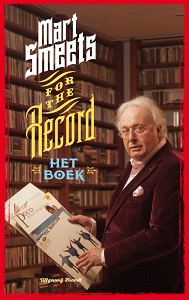
Mart Smeets (Arnhem, 11 januari 1947)
Cover
De Braziliaanse schrijver Oswald de Andrade werd geboren op 11 januari 1890 in São Paulo. Zie ook alle tags voor Oswald de Andrade op dit blog.
Babbling (Fragment)
Against cahinetism, the tramping of the climates.
The language without urchuisms. -’ithout erudilion.
Natural and nee-logic. The: millionaire contribution of all
Of the mistakes.
From naturalism one had passed to domestic
pyrography and to the excursionist kodak.
All the girls talented. Virtuosos of the player piano.
The processions went out of the bulge of the factories.
It was neceaeary to un-do. Deformation through
impressionism and the symbol. The lyricism brand~new.
The presentation of the materials.
The coincidence: of the first Brazilian construction in
the movement of general reconstrucuction. Brazilwood
poetry.
Against the naturalistic subtlety, the synthesis.
Against the copy, the invention and the surprise.
A perspective of an order other than visual. The
correspondent to the physical miracle in art. Closed stars
in the photographic negatives.
And the wise solar laziness. The prayer. The silent
energy. The hospitality.
Barbaric, picturesque and credulous. Brazilwood.
The forest and the school. The food, the minerals and the
dance. The vegetation. Brazilwood.
Vertaald door Flavia Vidal
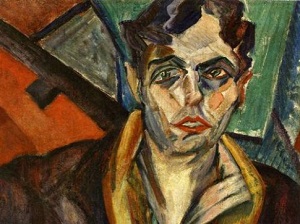
Oswald de Andrade (11 januari 1890 – 22 oktober 1954)
Portret door Anita Malfatti, 1925
De Spaanse schrijver Eduardo Mendoza werd geboren in Barcelona op 11 januari 1943. Zie ook alle tags voor Eduardo de Mendoza op dit blog.
Uit: Katzenkrieg (Vertaald door Peter Schwaar)
„Der ist vor einer Weile abgegeben worden.»
Der Umschlag war verschlossen und trug weder Absender noch Empfänger.
«Wer hat ihn gebracht? Der, der gestern nach mir gefragt hat?»
«Nein. Der da war ein junger, kesser Typ, sah aus wie ein Zigeuner. Er hat seinen Namen nicht genannt und nichts hinterlassen. Nur, ich soll Ihnen den Brief persönlich geben, sobald ich Sie sehe. Es sei wichtig. Das hat er gesagt.»
«In Ordnung», sagte Whitelands und steckte das Kuvert ein.
«Ich werde den Koffer packen. Bereiten Sie die Rechnung vor. Ich habe keine Zeit zu verlieren.»
Er ging in sein Zimmer hinauf, legte den Koffer aufs Bett und öffnete den Schrank, so dass seine wenigen Habseligkeiten zum Vorschein kamen. Bevor er sie in den Koffer verfrachtete, zog er den Umschlag aus der Tasche, ging damit zum Fenster, riss ihn auf und entfaltete ein mit großer, sauberer weiblicher Schrift beschriebenes Blatt. Der Text lautete:
Werter Anthony,
ich weiß, dass mein Vater und Sie heute Vormittag ein Treffen vereinbart haben, aber der vornehme Charakter,den mir unser kurzer Umgang an Ihnen festzustellen erlaubt hat, lässt mich befürchten, dass Sie nicht erscheinen werden. Bitte tun Sie es doch, es ist unbedingt nötig, dass wir uns noch einmal sehen. Nötig für mich, und wenn mich mein Instinkt und mein Verstand nicht trügen, auch für Sie.
Aus diesem gewichtigen Grund erlaube ich mir, Ihnen zu schreiben. Unser Butler, den Sie ja kennen, wird Ihnen meinen Brief zukommen lassen, von dessen Inhalt er nichts weiß, er weiß nicht einmal, wer ihn geschrieben hat. Falls Sie ihn sehen, lesen Sie den Brief nicht in seiner Gegenwart, und fragen Sie ihn nichts. Zerreißen Sie ihn nach der Lektüre.
Wenn Sie zu uns kommen, klingeln Sie nicht an der Eingangstür. Gehen Sie die Mauer entlang, bis Sie in der Seitenstraße zu einer schmalen Eisenpforte gelangen, die in den Garten führt. Klopfen Sie Punkt zwölf Uhr dreimal, und ich werde Ihnen öffnen. Wenn Sie kommen, versichern Sie sich, dass Ihnen niemand gefolgt ist oder Sie beobachtet. Zu gegebener Zeit werde ich Ihnen den Grund für all diese Vorsichtsmaßnahmen nennen.
Immer voller Vertrauen in Sie,
Paquita
Er las den Brief, ohne seine Bedeutung zu verstehen.“
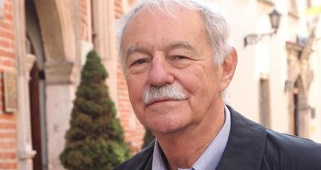
Eduardo Mendoza (Barcelona, 11 januari 1943)
De Duitse dichter en schrijver Gustav Falke werd geboren op 11 januari 1853 in Lübeck. Zie ook alle tags voor Gustav Falke op dit blog.
Das Licht
Ein Traum nur war es, ein Gesicht,
Aus Dämmerung geboren:
Es kam des Wegs ein kleines Licht,
Als hätt's den Weg verloren.
Es zitterte und schwankte sacht
Und flackerte im Winde;
Getragen ward es durch die Nacht
Von einem zarten Kinde.
Das schützte mit der rechten Hand
Das Flämmchen, mit der feinen,
Es glänzte durch die Fingerwand
Ein rosenrotes Scheinen.
Was bist du für ein Seelchen, Kind?
Sprach ich aus meinem Traume.
Sogleich erlosch das Licht im Wind,
Und dunkel war's im Raume.
Der Tulpenbaum
Der Tulpenbaum hat über Nacht
All seine Blumen aufgemacht,
Die weißen Sterne leuchten weit
In ihrer keuschen Herrlichkeit.
Es ist, als hätts die Nacht bedacht,
Was Liebes sie dem Tag vermacht,
Damit von ihrem Märchenglanz
Ein Schimmer leb in seinem Kranz.
Er aber, überreich an Licht,
Bedarf der fremden Sterne nicht,
Und bald entblättert, schnell und sacht,
Das liebliche Geschenk der Nacht.
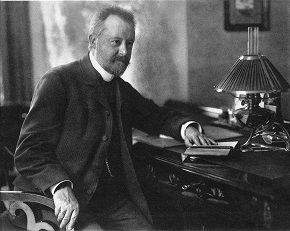
Gustav Falke (11 januari 1853 - 8 februari 1916)
De Amerikaanse schrijfster Diana Gabaldon werd op 11 januari 1952 geboren in Williams, Arizona. Zie ook alle tags voor Diana Gabaldon op dit blog.
Uit: A Breath of Snow and Ashes (Outlander 6)
“Yes, ma’am, I’ll do that.” She didn’t turn and go, though, but lingered, her gaze flickering over the mounds of drying herbs on the gauze racks and the implements of my surgery.
“Do you need something else, dear? Or did you have a question?” She’d seemed to understand my instructions perfectly well—but perhaps she wanted to ask something more personal. After all, she had no mother . .
“Well, aye,” she said, and nodded at the table. “I only wondered—what is it that ye write in yon black book, ma’am?”
“This? Oh. It’s my surgical notes, and recipes . . . er . . . receipts, I mean, for medicines. See?” I turned the book round and opened it so that she could see the page where I had drawn a sketch of the damage to Miss Mouse’s teeth.
Malva’s gray eyes were bright with curiosity, and she leaned forward to read, hands carefully folded behind her back as though afraid she might touch the book by accident.
“It’s all right,” I said, a little amused by her caution. “You can look through it, if you like.” I pushed it toward her, and she stepped back, startled. She glanced up at me, a look of doubt wrinkling her brow, but when I smiled at her, she took a tiny, excited breath, and reached out to turn a page.
“Oh, look!” The page she’d turned to wasn’t one of mine, but one of Daniel Rawlings’s—it showed the removal of a dead child from the uterus, via the use of assorted tools of dilatation and curettage. I glanced at the page, and hastily away. Rawlings hadn’t been an artist, but he had had a brutal knack for rendering the reality of a situation.”
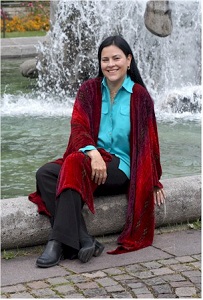
Diana Gabaldon (Williams,11 januari 1952)
Zie voor nog meer schrijvers van de 11e januari ook mijn blog van 11 januari 2015 en ook mijn blog van 11 januari 2016 deel 2.
|



